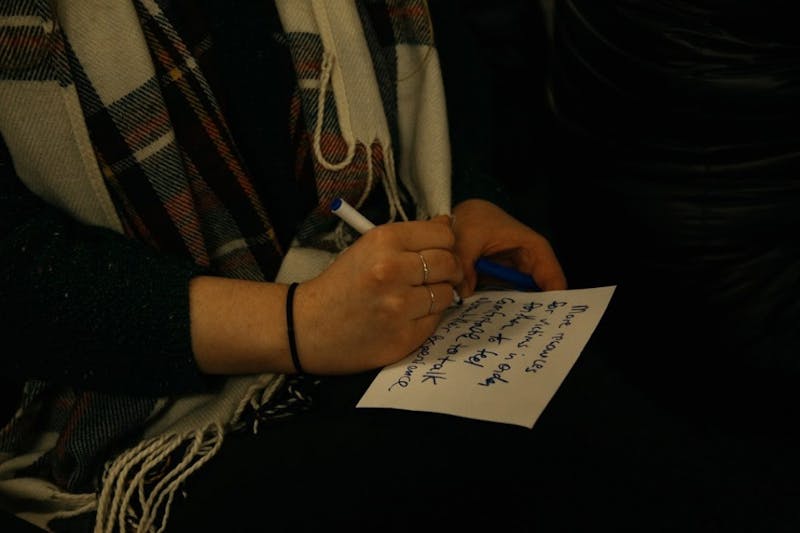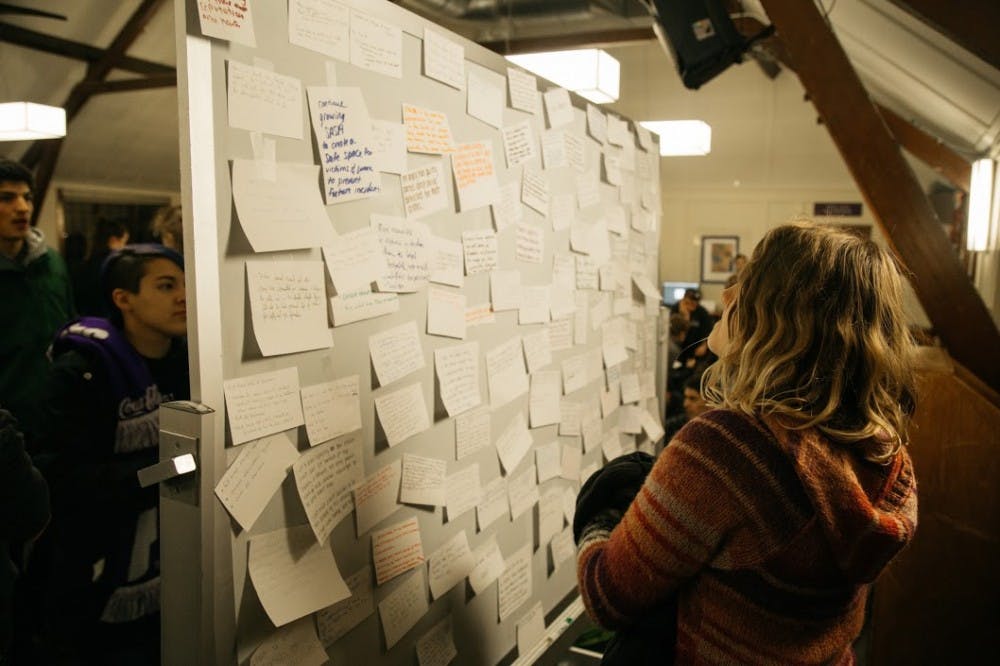More than 400 students took a stand against sexual violence in December after one freshman's dissatisfaction with the University’s conduct process started a campus-wide conversation on the subject. That night, students wrote suggested “action plans” for how the University should improve in its handling of sexual assault cases on note cards, which were collected by ASUP representatives, who organized the event.
The suggestions included things like “more resources for victims” and targeted actions to “prevent future incidents”.
Now, those recommendations have been compiled by students and staff members at the Health and Counseling Center and presented to the committee appointed by President Fr. Mark Poorman to review the school’s Title IX practices and procedures.
“The purpose (of the stand-in) wasn’t solely to give people a voice — the point is to do something with your suggestions, to do something with the emotions and the drive you had, to take that and make change from it,” said Tiger Simpson, UP’s wellness education and prevention program coordinator. “We don’t want to lose that momentum.”
During Winter Break, Simpson, along with Students Against Sexual Assault, the Student Health Advisory Board and others, read through the 200-some recommendations and condensed them into a three-part list.
Simpson said it’s important to distinguish between the various processes that may be invoked during an incident of sexual assault on campus: There is a student conduct process and a Title IX process, and students who undergo the Title IX process (which focuses on resources for survivors of sexual assault) won’t necessarily go through the student conduct process if they don’t choose to. While the student conduct process and Title IX process may work together in some cases, they are not the same and the members involved are different.
Title IX is a federal law that doesn’t deal solely with sexual assaults; rather, it prohibits sexual discrimination on a variety of levels in education.
The review committee currently is in charge of investigating the Title IX process, not the student conduct process. The committee is reviewing the University's steps in addressing sexual discrimination, harassment and violence and prevention efforts against these issues on campus.
Simpson also noted the difference between mandated and non-mandated reporting resources. The Health and Counseling Center and Campus Ministry are confidential resources that do not have to report an instance of sexual assault to the Title IX coordinator, while other potential support systems, like professors, do.

The first part of the list addresses general recommendations made by students to the Title IX review committee and University administration. Specifically, the recommendations call for greater transparency about the Title IX process, more information on the makeup of the student conduct board and increasing community-wide education on consent, among others.
While, clearly, individual case details cannot be released, students say they want to know what to expect if they choose to go through the University’s Title IX and student conduct processes, and what their other options are if they don’t.
The second part of the list covers specific recommendations from survivors of sexual assault who have been through the student conduct process and/or the Title IX process. These suggestions include clearer notice of resources to victims and constant communication throughout these processes.
Students also suggested there be trained student advocates for both the reporter and respondent parties.
Finally, the third part of the list identifies “areas for education,” including education on consent, sex and healthy relationships on campus. One proposed idea is to make this education part of the required core curriculum or to work it into the obligatory freshman workshops.
“People want to know definitions of ‘consent,’ of ‘intoxication,’ of ‘incapacitation,’ to be able to understand them,” Simpson said. They want to understand what are these words we’re tossing around mean because not everyone is in a law class or has studied violence before or psychology.”
Some of the recommendations don’t deal directly with Title IX — for example, students want to see trained, neutral parties who have multiple perspectives to evaluate sexual assault cases.
Simpson stressed that the list was only compiled, not filtered — every suggestion was given consideration, not screened as “good” or “bad”.
Since some of the recommendations called for resources that are already technically available, such as confidential sources for survivors of sexual assault to talk to, Simpson says he thinks the University must do a better job of advertising them to students and making them accessible.
The list was first emailed to the head of the Title IX committee on Jan. 16. On Feb. 15, Simpson and Director of the Health and Counseling Center Margaret Trout met with the committee to review the list and present updates. Simpson also discussed the recommendations with ASUP Senate members last month and urged them to encourage conversation about reducing the number of sexual assaults on campus.
Simpson says the committee will continue to meet with other resources and groups on campus over the next two months. They have also put out an email survey for UP students to fill out in hopes of better understanding how students hope to address the issue of interpersonal violence on campus.
“Right now, people are calm, but they’re not done. That energy, those emotions — they’re still there, but that doesn’t mean our job is done,” Simpson said.
The committee will eventually present all of its findings and recommendations to University President Fr. Mark Poorman, though an official date for this has not been set.
“They are excited to get student feedback, they are glad that people are getting behind it,” Simpson said.
Students interested in being more involved in the issue can do so by becoming a SAFE Advocate, which requires training through the Health and Counseling Center. SAFE is a 24-hour hotline at UP that either party involved in a sexual assault can call to talk to non-mandated reporter anonymously, to seek resources or submit a report following an incident of sexual violence. SAFE representatives can also act as advocates for either party during the student conduct hearing.
Simpson says he’s eager to take the energy present in St. Mary’s in December and move forward to create positive changes on campus, taking efforts beyond contacting the Title IX review committee.
“Where do we go from here?” Simpson said. “We take the energy and those emotions people had and put in a driving force to enact change, to enact empowerment, to enact community.”
In addition to submitting the student recommendations, the Health and Counseling Center has teamed up with Campus Ministry and Residence Life to host discussions in the dorms about what healthy relationships and consent look like. To reach off-campus students, they will be hosting a discussion in the library.
During Diversity Dialogues Week next week, the Student Health Advisory Board will present on healthy relationships and Students Against Sexual Assault will present on consent.
“As community members, it is important we look at this and evaluate what we agree with, what is practical, and what we want to focus on,” Simpson said. “We have a lot of energy around this topic; we just need to work together to make something positive come of it.”








